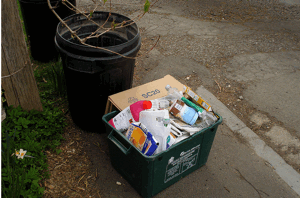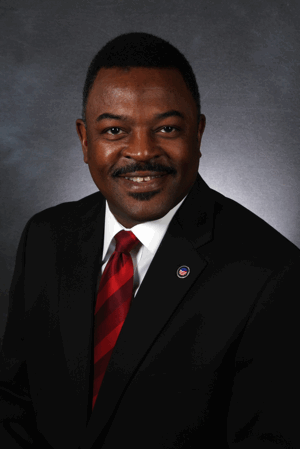High Tech Trash
Air Date: Week of September 10, 2010

Recycling on the curb. (Photo: net_efekt)
Cleveland, Ohio has recently expanded a program to encourage recycling among its residents. Cleveland’s Commissioner of Waste tells host Jeff Young that the new program will use high tech tracking to help Cleveland’s bottom line, and eventually convert much the city’s waste into electricity.
Transcript
YOUNG: Cleveland, Ohio is hoping some high tech can turn the city’s trash into cash. Soon, residents will receive new recycling bins embedded with radio frequency ID chips. The RFID chips are like those used to nab shoplifters. But in Cleveland- they’ll be used to keep tabs on who’s not recycling. Ron Owens is in charge of the project - he’s Cleveland’s Commissioner of Waste – Mr. Owens, welcome to Living on Earth!
OWENS: Hey- glad to be here!
YOUNG: Well, how does this work? How are you going to know if someone isn’t recycling?
OWENS: Well actually the way we set our system up is that we have a two-cart system. We have a grey cart for your regular garbage and then we have a blue cart for your recycling. And, inside those carts will be our RFID code, which will basically be used for us to track how often this particular service is provided to certain areas. And, it will also track the performance of my employees.

Cleveland's Commissioner of Waste, Ron Owens.
YOUNG: Uh huh. So, if the chip detects that the grey bin is getting a lot of use but the blue bin isn’t, you know they’re not recycling.
OWENS: Yeah, I mean what we’re looking for is sort of like a threshold, at least once or twice a month that people are recycling. So, if we go maybe like five weeks in a row and notice that a particular resident hasn’t set out their recycling can, that next time we go out and collect their rubbish, if there still isn’t a recycling can out there, then we will actually open up their bag of trash that’s out there, take a photo and then that will be our proof.
YOUNG: Mm hmm. And what do you do with that evidence?
OWENS: The city of Cleveland for the last 20 or so years that I’ve been involved with the division of waste collection, has had this ticketing process for those people that violate our waste laws. Actually, only difference it is going to be with this system is that we are collecting the recyclables separately. Right now, if you don’t put your trash out properly in the city of Cleveland, you may be subject to a fine.
You can be subject for a fine for putting your trash out too early, not taking your containers back in a timely manner. If you have excess trash out there, those are the individuals that we’re actually looking to give tickets to. But everybody else we’re definitely going to try to educate them to properly utilize these containers.
YOUNG: Have you ticketed people before for not recycling, though?
OWENS: No, not for recycling we haven’t. That’s a new law that we had put in place to help us enforce this program.
YOUNG: How much would the ticket be?
OWENS: Um, the penalty is basically a hundred dollars per incident.
YOUNG: A hundred bucks? If I get a parking ticket for a hundred bucks, I generally think that’s pretty steep!
OWENS: Yeah, it is a pretty steep fine. And that’s one of the things we want to do is encourage the residents to properly utilize these carts. And if you properly set out your garbage container and then you properly separate your recycling and put it into your blue container, then you wouldn’t have to worry about that hundred dollar fine.
YOUNG: Why is it necessary to threaten people with a hundred dollar fine for not recycling?
OWENS: We had a pilot program back in October of 2007 that we started with and we had approximately 20 percent participation. And, once we’ve seen that voluntarily there is a number of folks that will not use this cart properly, then we had to figure out we needed enforcement. And here’s another reason why we need to properly utilize these containers: we’re looking at generating some new energy for the city of Cleveland.
What I mean by that ‘new energy’ is potentially going to a waste-energy facility. And we’re going to take our garbage from that point and turn it into steam, which is going to turn some turbines and generate some electricity. And, that’s another reason why we need to separate those materials which are more recyclable from your regular garbage, because we want to gain as much financial gain off of this amount of material that we have as possible.
YOUNG: What’s your level of concern about generating some backlash here?
OWENS: When the law was passed, a lot of folks focused on the fine piece of it, and then they looked at the RFID tag and though ‘oh, wow, Big Brother is looking into us,’ and no it’s not. It’s not Big Brother. All it is, is a performance-based system that we’re putting in to make sure that we achieve those efficiencies.
It’s really not us going to be going through the trash. That’s the last thing that we want to do is to have to sort through your trash to see if there is recyclables in there or not. Again, once we get out there and explain to the residents, which we’re currently working on an educational plan right now. We’re going to have the carts with us, we’re going to have our facts with us, and we’re going to lay it all out for them. So, they won’t have to be concerned about us going through their trash, or any concerns about privacy issues.
YOUNG: And, give us a sense of how much money is at stake here…
OWENS: Well, this program is going to cost us about 25 million dollars over the next four to five years. So, although it is an expensive program, we believe with the efficiencies and savings that we’re looking at, we definitely are going to recover this cost. We’re currently being paid some 27 dollars per ton for our recyclables.
So, what that means is, for every ton of recyclables that I save from going out into the landfill, I make 27 dollars on that, as well as I save the 33 dollars that I would be paying to dispose of that material. So when you add the 27 plus that 33, that’s actually a 60 dollar savings. We get rid of some 220 thousand tons of trash annually.
Forty two percent of that waste is recyclable. If you can compare 42 percent of that waste with somewhere around a 100 thousand tons, if I’m able to collect that 100 thousand tons times that 60 dollars that I save- you know, that’s a substantial amount of money that’s really being save to our general fund budgets.
YOUNG: Do you think this is going to catch on? Are other cities going to be doing this?
OWENS: Yes, as a matter of fact, there are a number of other cities: Charlotte, North Carolina, places in Washington DC, and quite a number of other places that are actually utilizing technology similar to this.

Recycling on the curb. (Photo: net_efekt)
YOUNG: Well, Mr. Owens, one more thing…I understand some congratulations are in order. The American Public Works Association named you National Manager of the Year in Public Waste, is that correct?
OWENS: Yes. I have received a number of rewards in regards to this. It’s truly good. This just shows that we’re heading in the right direction with the things that we are trying to do with the city of Cleveland.
YOUNG: You’re at the top of the heap, one might say.
OWENS: (laughs) The top of the heap, okay, yes sir.
YOUNG: Ron Owens, Commissioner of Waste in Cleveland, Ohio. Thank you very much!
OWENS: Thank you, it was a pleasure being here.
[MUSIC: Karl Denson “Dance Lesson #2” from Dance Lesson #2 (Blue Note Records 2001)]
YOUNG: Just ahead- a trip to the far north to record a vanishing language and way of life - keep listening to Living on Earth!
[MUSIC: Monty Alexander: “Soulful Strut” from Monty Meets Sly And Robbie (Telarc Records 2000)]
Links
Cleveland's waste collection website
See what Arlington, VA is doing
Living on Earth wants to hear from you!
Living on Earth
62 Calef Highway, Suite 212
Lee, NH 03861
Telephone: 617-287-4121
E-mail: comments@loe.org
Newsletter [Click here]
Donate to Living on Earth!
Living on Earth is an independent media program and relies entirely on contributions from listeners and institutions supporting public service. Please donate now to preserve an independent environmental voice.
NewsletterLiving on Earth offers a weekly delivery of the show's rundown to your mailbox. Sign up for our newsletter today!
 Sailors For The Sea: Be the change you want to sea.
Sailors For The Sea: Be the change you want to sea.
 The Grantham Foundation for the Protection of the Environment: Committed to protecting and improving the health of the global environment.
The Grantham Foundation for the Protection of the Environment: Committed to protecting and improving the health of the global environment.
 Contribute to Living on Earth and receive, as our gift to you, an archival print of one of Mark Seth Lender's extraordinary wildlife photographs. Follow the link to see Mark's current collection of photographs.
Contribute to Living on Earth and receive, as our gift to you, an archival print of one of Mark Seth Lender's extraordinary wildlife photographs. Follow the link to see Mark's current collection of photographs.
 Buy a signed copy of Mark Seth Lender's book Smeagull the Seagull & support Living on Earth
Buy a signed copy of Mark Seth Lender's book Smeagull the Seagull & support Living on Earth

